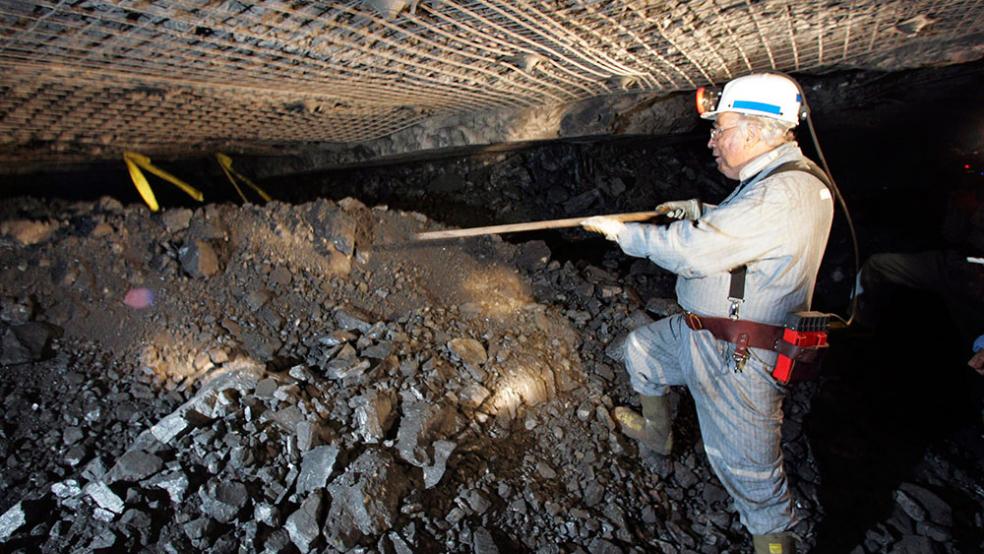Every year, 5,000 to 9,000 tons of coal mined from the rugged hills of Tamaqua in northeast Pennsylvania is loaded onto railcars and shipped to Rotterdam. From there, the coal is moved by barge, railcar or truck to a storage facility in a remote part of Germany.
When it comes time for the Air Force and Army to turn on the heat at a large military maintenance and repair installation in the small town of Kaiserslauntern in southwestern Germany, the utility there must burn only anthracite coal shipped 4,000 miles from Pennsylvania.
Related: A $10 Billion Missile Defense System Gets Added to ‘Government Waste’
While less expensive foreign Bituminous Coal and other heating sources are readily available, a long-standing congressional earmark tucked away in the defense appropriations law requires the local utility in Germany to burn Pennsylvania coal along with other fuels. Cost to the taxpayers? About $1.5 million of the $17 million the U.S. pays annually to heat all U.S. military facilities in Kaiserlautern.
Steve Ellis, vice president of Taxpayers for Common Sense, calls the congressionally mandated arrangement “the boondoggle that won’t die,” and indeed there is some mystery to why a provision dating back to the early 1960s that makes little economic or budgetary sense remains embedded in the federal government’s spending laws.
Related: 5 Government Reforms That Could Save Billions
The congressional mandate can be found again this year in Section 8053 of the 164-page House defense appropriations bill for fiscal 2016 awaiting action. Although the congressional champions of this mandate – including the late Democratic Reps. Daniel Flood and John Murtha of Pennsylvania – have long passed from the scene, legislative inertia more than anything else seems to be keeping it alive.
“Even though the original supporters are no longer around, it’s like on auto-pilot – it’s always in there, so they just leave it,” Ellis said in an interview.
And while $1.5 million a year is a pittance compared with the hundreds of billions of dollars that the Pentagon spends each year, Ellis and other critics say the provision is a troubling testament to the staying power of wasteful government spending.
During the peak of this policy, between 1962 and 1988, U.S. taxpayers spent more than $1.1 billion on additional heating costs because of the requirement that Pennsylvania coal be used overseas, according to one study.
On Thursday, Taxpayers for Common Sense awarded the House and Senate Appropriations Committees its “Golden Fleece Award” for helping to perpetuate this seemingly ridiculous policy.
The roots of the boondoggle date back to shortly after World War II, when a handful of Pennsylvania lawmakers saw an opportunity to try to prop up the dying coal industry in northeast Pennsylvania by forcing the Pentagon to use Pennsylvania-produced coal to heat some of the overseas military facilities. Anthracite, a hard, carbon-dense and more expensive variety of coal, was mined exclusively in Pennsylvania, and in the post-World War II period, miners were suffering from layoffs and loss of income.
Related: Ashton Carter: Americans Are Disgusted with Government Waste
Over the years, the Pentagon tried to scale back the use of anthracite coal in favor of less expensive coal or alternative fuels. But Flood and Murtha, among others, used their influence on the House Appropriations Committee to preserve this carve-out in the defense spending bill.
Flood left Congress in 1980 after pleading guilty to corruption charges and died in 1994. One of Flood’s aides, Michael Clark, founded the Anthracite Industry Association and continued lobbying Congress to preserve the coal legislative language.
“I’m one of the arch-culprits,” Clark said half-jokingly in an interview on Friday describing his role in defending the program over the years. Clark represented the anthracite producers years ago but now represents Stadtwerke Kaiserslautern, the city-owned utility that is required to burn American anthracite in its Air Force heating contract.
“The most important thing is that the program today is nothing like what it was in the 1960s when it started,” he said. “It’s entirely different, and the difference started 15 to 16 years ago” when the Defense Department began closing many of the scores of military installations in Germany and relied more on municipal energy systems for heat.
Clark offered a vigorous defense of the current program, saying that it “allows for U.S. anthracite to be part of the energy mix that serves the greater Kaiserslautern area” – and in a way that has been shown to be “both fiscally sound and environmentally friendly.”
“Expanded use of other fuels would trigger costly and unnecessary retrofit of the cogeneration facility, in turn subsequently resulting in increased energy charges reflected in the military’s ongoing heating bills,” Clark said.
Rep. Matt Cartwright (D-PA) today represents Flood’s old district. He first won election in 2012 running as an environmentalist.
During a public hearing last year in Wilkes-Barre, Pa., Cartwright conceded that the coal earmark was not ideal from an environmental standpoint but added that it was not likely to be changed anytime soon. “It’s one of those things in Washington that if you want to dislodge it, you have to well up a force of steam to get that done,” he told National Public Radio. “I’m not aware of any great groundswell of support to get rid of it at this point.”
This story was revised June 16 to correct the cost to the U.S. of the congressional mandate.
Top Reads from The Fiscal Times:


